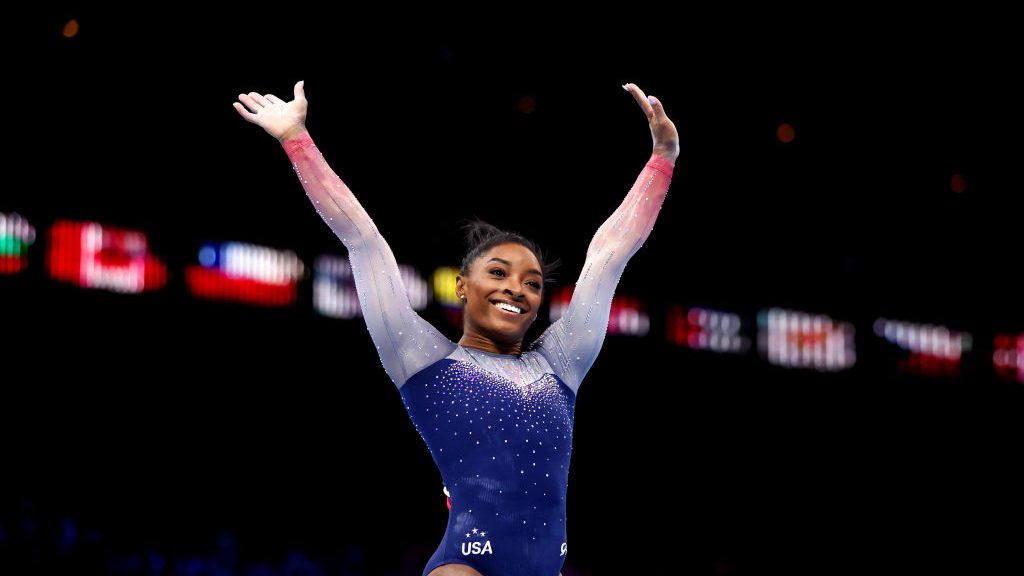We bring news that matters to your inbox, to help you stay informed and entertained.
Terms of Use and Privacy Policy Agreement
WELCOME TO THE FAMILY! Please check your email for confirmation from us.
OPINION: With dominant performances at the U.S. and world championships and a new skill that bears her name, the superstar gymnast cemented her GOAT status and sent a message to the doubters who thought she was done after the 2020 Olympics.
Editor’s note: The following article is an op-ed, and the views expressed are the author’s own. Read more opinions on theGrio.
Pick a sport — any sport — and consider which athletes are lauded as the world’s best. Take a mental snapshot.
Now look through history’s lens and scroll through past decades. The picture gets paler and paler the further back you go, brown faces slowly disappearing like Marty McFly’s hand in “Back to the Future.”
That era is romanticized by those who desire its return, with some bad actors working earnestly to rewind time and reverse progress on a grand scale. Unfortunately for them, no one is lightening major team sports like football and basketball, where dominant Black athletes are plentiful and permitted to thrive. Even worse, colorization is happening in gymnastics, too, where a bevy of Black girls can see themselves in the GOAT, Simone Biles.
In case you forgot or thought she was cooked, Biles sent reminders this week at the World Championships in Belgium. She became the first female gymnast to perform a skill that looks as dangerous as its old name — the Yurchenko double pike vault. Historically only done by men, the element is officially renamed the Biles II.
Roman numerals are necessary because she already owned the Biles on vault. Three other gymnastics skills bear her name in the international rule book: the Biles and Biles II on floor exercise, and the Biles on balance beam.
When we talk about signature moves with her, it’s not just a figure of speech.
What a joy to watch the diminutive ball of muscles and grace as Biles sprints down the runway, springs onto the vault and stretches our imagination. We hold our breath as she flies through the air, flipping end over end, coiling and contorting like no one before. Her power on Biles II is so immense that she often bounds backward upon landing — a points deduction — and her co-coach Laurent Landi stands on the mat as a safety measure — another deduction.
Cecile Landi, who coaches with her husband, told the Washington Post that Biles II “is a very difficult vault, and one mistake can have serious consequences.” Judges can deduct all they want, but Biles ain’t studying them. The vault’s difficulty value (6.4) leaves plenty of room to spare against her competitors’ toughest vault (5.6).
We feared we’d seen the last of her at the 2020 Olympics when suffered a bout of “the twisties,” a sense of feeling disoriented in the air. Catastrophic injuries can follow. “I literally cannot tell up from down,” she said on Instagram after withdrawing from multiple events. “Since I have no idea where I am in the air I also have NO idea how I’m going to land, or what I’m going to land on. Head/hands/feet/back.”
But her fortitude is neck-and-neck with her physical strength, allowing her to return and win a record eighth all-around title at the U.S. Gymnastics Championship in August.
Already the most decorated gymnast in the U.S. — 32 medals across the Olympics and world championships — she figures to have more next summer after the Paris Olympiad. Her thoughts on the matter are private. “I like to keep (my goals) personal, just so that I know what I’m aiming for,” Biles told The Associated Press. “I think it’s better that way. I’m trying to move a little bit differently this year than I have in the past. I think it’s working so far, so I’m going to keep it secretive.”
It’s no secret she’s the greatest gymnast of all time (sorry, Nadia Comăneci), the latest in a line of Black pioneers that includes Gabby Douglas, Dominique Dawes and Luci Collins, who in 1980 became the first Black female on the U.S. Olympic team. Ten years after debuting at the World Championships, Biles remains the standard-bearer and inspires other sisters, like U.S. teammates Shilese Jones and Skye Blakely.
Jones, Konnor McClain and Jordan Chiles made history last year as the first Black women to sweep the all-around competition at the U.S. Gymnastics Championships. Earlier that year, Fisk University became the first HBCU with a women’s gymnastics team, since joined by Talladega College. Grambling could be next, giving PWIs more competition in landing star prospects.
Onnie Willis Rogers, one of just five Black women to win the NCAA individual all-around title (with UCLA in 2001), is astonished by the sport’s dramatic increase in racial diversity. “To be honest, it’s hard to name all the women of color who have made it to the top ranks since I stopped competing,” she wrote for CNN. “The list goes on and on … I can’t think of another major sport that has seen its ranks change so dramatically.”
It’s a lengthy list with 26-year-old Biles planted on top. Her recent exploits in Belgium and her anticipated feats in Paris are sure to encourage more Black girl magic in gymnastics. Not everyone likes it.
But everyone better get used to it.
Deron Snyder, from Brooklyn, is an award-winning columnist who lives near D.C. and pledged Alpha at HU-You Know! He’s reaching high, lying low, moving on, pushing off, keeping up, and throwing down. Got it? Get more at blackdoorventures.com/deron.
TheGrio is FREE on your TV via Apple TV, Amazon Fire, Roku and Android TV. Also, please download theGrio mobile apps today!

